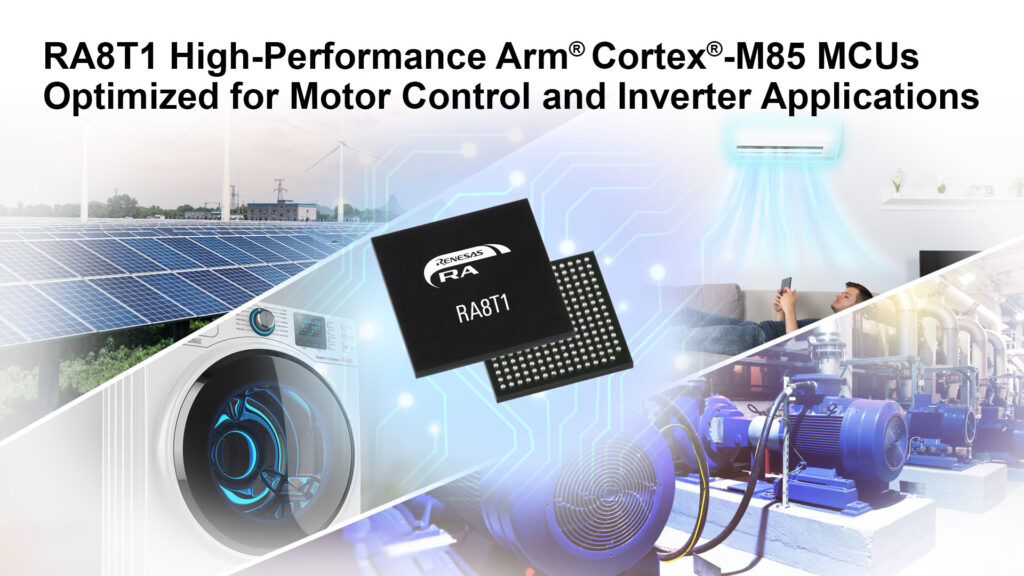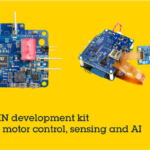ASIA ELECTRONICS INDUSTRYYOUR WINDOW TO SMART MANUFACTURING
Automation Gets Big Boost From Renesas’ New MCUs
Renesas Electronics Corporation has introduced the RA8T1 microcontroller (MCU) group based on the Arm® Cortex®-M85 processor. Accordingly, RA8T1 devices address real-time control of motors, power supplies, and other products commonly used in industrial and building automation, as well as smart homes.
The RA8T1 group is the third in Renesas’ RA8 Series, all of which deliver breakthrough performance of 6.39 CoreMark/MHz1. All RA8 MCUs take advantage of the high performance of the Arm Cortex-M85 processor and Arm’s Helium™ technology that provides up to a 4X performance boost for digital signal processor (DSP) and machine learning (ML) implementations over the Cortex-M7 core. This added performance in RA8T1 devices suits AI functions that can predict maintenance requirements for motors, reducing costly downtime.

Feature Set Optimized for Motor Control
The new RA8T1 devices include advanced PWM timing features such as 3-phase complementary output, 0% and 100% duty output capability, a double-buffer compare match register, and five phase counting modes. Meanwhile, the analog capabilities of the new MCUs include 12-bit ADCs, 12-bit DACs and high-speed comparators used in voltage and current measurement and over-current protection.
Moreover, the RA8T1 MCUs also offer multiple communications functions, including SCI, SPI, I2C/I3C, CAN/CAN-FD, Ethernet, and USB-FS. The new group also provides port output shutdown capability when it detects anomaly. Thus, an important safety feature in motor control. These capabilities combined with the advanced timers and Renesas’ power management expertise, enable customers to build comprehensive, low-power motor control solutions.
Leadership in Embedded Processing for Motor Control
Renesas has shipped motor-control-specific MCUs for over 10 years. The company ships over 230 million motor control embedded processors per year to thousands of customers worldwide. In addition to multiple RA MCU groups, Renesas offers motor-control-specific devices in its 32-bit RX Family, its 16-bit RL78 MCUs and its 64-bit RZ MPUs. Renesas also introduced the industry’s first RISC-V-based ASSP designed for motor control.
“Renesas is already the market leader in motor control with the widest MCU portfolio for smart home, building and factory automation systems,” said Daryl Khoo, Vice President of the Embedded Processing 1st Division at Renesas.
Furthermore, Khoo said, “The performance of these MCUs is critical in high-speed electric motor control that requires sophisticated algorithms and application software to run in a reliable, safe, and secure manner.”
The RA8T1 MCUs bring unprecedented CPU horsepower to the portfolio along with Helium technology that allows our customers the additional flexibility to deliver smart (AI/ML) solutions without the need for additional hardware.
Key Features of the RA8T1 Group MCUs
- Core: 480 MHz Arm Cortex-M85 with Helium and TrustZone
- Memory: Integrated 2MB/1MB Dual-bank Flash memory and 1MB SRAM (including 128KB TCM, 512KB ECC protected)
- Analog Peripherals: Advanced 18-channel PWM timers, 12-bit ADC, 12-bit DAC, high-speed comparators
- Communications Peripherals: Ethernet MAC, USB-FS, CAN-FD, I2C/I3C, SPI, SD and MMC memory card interfaces
- Advanced Security: Leading-edge cryptographic algorithms, TrustZone, Secure Boot, immutable storage, tamper resistance with DPA/SPA attack protection, secure debug, secure factory programming and lifecycle management support
- Packages: 100-, 144- and 176-pin LQFPs, 224-pin BGA
The new RA8T1 Group MCUs got the support of Renesas’ Flexible Software Package (FSP). Particularly, the FSP enables faster application development by providing all the infrastructure software needed, including multiple RTOS, BSP, peripheral drivers, middleware, connectivity, networking, and security stacks. In addition, it comes with reference software to build complex AI, motor control, and cloud solutions. It allows customers to integrate their own legacy code and choice of RTOS with FSP. Thus, providing full flexibility in application development. Using the FSP will ease migration of existing designs to the new RA8 Series devices.




